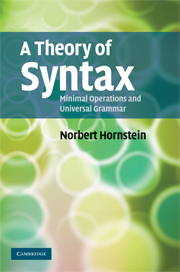Book contents
- Frontmatter
- Contents
- Preface
- 1 Minimalism and Darwin's Problem
- 2 Deriving c-command
- 3 Labels, recursion and movement
- 4 Some thoughts on adjunction
- 5 The emerging picture: Basic operations, FL and the Minimalist Program
- 6 Stop AGREEing! Keep Moving!
- 7 Conclusions, consequences and more questions
- References
- Index
7 - Conclusions, consequences and more questions
Published online by Cambridge University Press: 01 July 2009
- Frontmatter
- Contents
- Preface
- 1 Minimalism and Darwin's Problem
- 2 Deriving c-command
- 3 Labels, recursion and movement
- 4 Some thoughts on adjunction
- 5 The emerging picture: Basic operations, FL and the Minimalist Program
- 6 Stop AGREEing! Keep Moving!
- 7 Conclusions, consequences and more questions
- References
- Index
Summary
What we have wrought
In the previous six chapters I have tried to outline a minimalist project that takes the “success” of GB (and kindred theories) as starting point. Thus, I have assumed that GB has “more or less” correctly identified (many of) the “laws of grammar,” e.g. the “law” that reflexives must be locally bound, that binding necessarily involves c-command, that minimality governs movement, that only c-commanding interveners count in determining minimality, that movement is (in the standard cases) to c-commanding positions, etc. I then proposed that we consider GB an “effective” theory in the sense that we treat it as roughly empirically correct and try to derive its “laws” from more general principles. The word “roughly” is important here. For example, there may be cases in which a GB claim is empirically qualified. A case in point: as noted in Chapter 2, there may well be cases of binding without c-command and such cases could prove decisive in evaluating the enterprise. However, the project outlined here (and the Minimalist Program quite generally) starts from the assumption that the empirical generalizations at the core of GB and its generative cousins correctly describe the lay of the grammatical land. The novelty of minimalism (and the present project) is to take GB's success as posing a theoretical challenge; to solidify these results by grounding them in deeper and more natural principles.
The main motivation for the theoretical project is provided by the evident complexity of GB style theories.
Information
- Type
- Chapter
- Information
- A Theory of SyntaxMinimal Operations and Universal Grammar, pp. 155 - 180Publisher: Cambridge University PressPrint publication year: 2008
